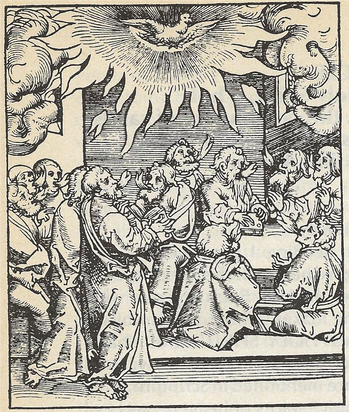A Sabbath Day's Journey
By: Rev. Paul Landgraf
What is a Sabbath day's journey? First of all, it is a Jewish expression. We measure distances in meters or yards. The Jews had a certain distance that they could walk on Saturday before it would be considered work. So their synagogues that they went to on Saturday could not be very far away. The word appears only in Acts 1:12 and indicates a distance of about three-quarters of a mile.
With that in mind, I think it is important to remember the origins of Christianity. Just because we have an Old Testament, it does not mean that we call it the 'Outdated Testament'. Much of the Old Testament has a literary structure that we are not aware of because of our modern emphasis on chapter and verse divisions. Within many of these blogs, I try to get the reader to see a bigger picture, a larger perspective that often includes the Old Testament and the environment that was present when the New Testament was seeing the Light of the day.
Second, a Sabbath day's journey is intentionally short. These 'journeys' with a text, almost always one of the three readings for that Sunday, are deliberately brief discussions. This blog was never designed to be a comprehensive look at any text. Sometimes a specific word is studied in detail. But, as a whole, a blog entry, by itself, is meant to be quite brief.
Finally, since the term 'Sabbath day's journey' appears in Acts, it is meant to appeal to a wide variety of people. This blog is meant for those who cannot come on Sunday mornings. And it is also for those who do come on Sunday mornings but would also like a further study of the text. It is also for those who live somewhere else in the world (besides Drake and Freedom, Missouri, USA) and would simply like a further study of the text. It was meant to get these different groups of people to start thinking about the biblical texts. Part of the reason for this blog is that I am not able to have a bible class on Sunday mornings with either congregation, and so, to have a blog like this seemed like a good idea. I hope it is helpful for you, in whatever situation you may be.
Any feedback would be greatly appreciated. And thank you for taking the time to read this!
With that in mind, I think it is important to remember the origins of Christianity. Just because we have an Old Testament, it does not mean that we call it the 'Outdated Testament'. Much of the Old Testament has a literary structure that we are not aware of because of our modern emphasis on chapter and verse divisions. Within many of these blogs, I try to get the reader to see a bigger picture, a larger perspective that often includes the Old Testament and the environment that was present when the New Testament was seeing the Light of the day.
Second, a Sabbath day's journey is intentionally short. These 'journeys' with a text, almost always one of the three readings for that Sunday, are deliberately brief discussions. This blog was never designed to be a comprehensive look at any text. Sometimes a specific word is studied in detail. But, as a whole, a blog entry, by itself, is meant to be quite brief.
Finally, since the term 'Sabbath day's journey' appears in Acts, it is meant to appeal to a wide variety of people. This blog is meant for those who cannot come on Sunday mornings. And it is also for those who do come on Sunday mornings but would also like a further study of the text. It is also for those who live somewhere else in the world (besides Drake and Freedom, Missouri, USA) and would simply like a further study of the text. It was meant to get these different groups of people to start thinking about the biblical texts. Part of the reason for this blog is that I am not able to have a bible class on Sunday mornings with either congregation, and so, to have a blog like this seemed like a good idea. I hope it is helpful for you, in whatever situation you may be.
Any feedback would be greatly appreciated. And thank you for taking the time to read this!
